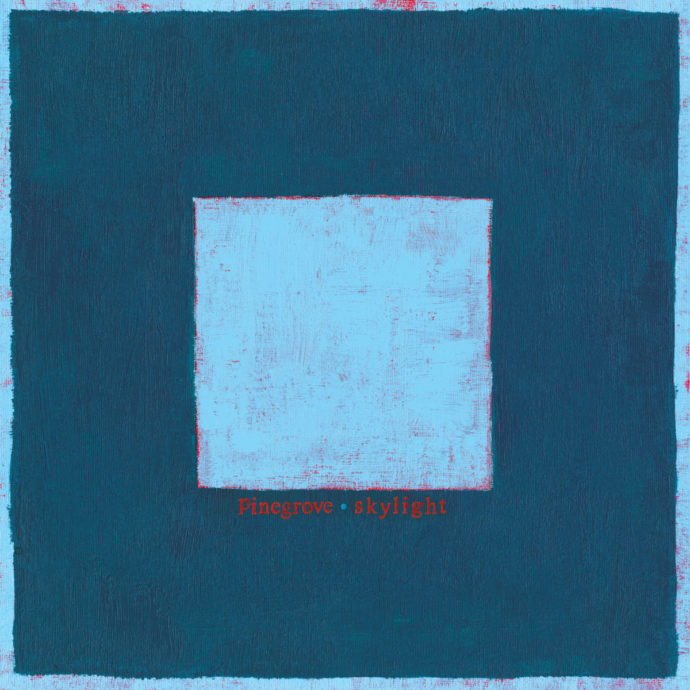A year and a half after its completion, Pinegrove released their sophomore effort, Skylight, on September 28th. Allegations of sexual coercion against the lead singer, Evan Stephens Hall, were behind the delay, marring the once uncorrupted image of inclusivity and thoughtful exuberance that characterized the bands ascent. Days before the release of the album, Pitchfork ran an article detailing some of the events surrounding the allegations and subsequent fallout. That piece says more about the situation than can be said here, but there is a great deal to consider in this situation, regarding both how we respond to sexual assault in a way that respects the victim and how, if, and when we allow offenders back, not just into our own lives, but into society at large.
Though the album was written before these allegations came to light, the first lines of the opening track, “Rings,” proved prescient, confronting the listener with the realization that Pinegrove and their lead singer have been indelibly altered by the events of the last year. Hall sings, “I draw a line in my life/ Singing this is the new way I behave now”. The placement of this song at the start of the album makes it clear that, no matter when the lyrics were written, they have come to take on a new meaning for the band.
With the third track, “Intrepid”, the band recalls their “next-generation emo” label, as Hall’s wilting opening lines, “Don’t let it get to you you said/Well I did” build until they burst into an emotional roar that has come define the band’s most beloved songs. The crisp sound of Zach Levine’s drums and the expansive synth sounds create space for the song to expand, growing alongside Hall’s passionate vocal. Further, this song does well to give an expanded role to Nandi Rose Plunkett, multi-instrumentalist and backing vocals for Pinegrove, and lead singer/creative engine of the band Half Waif. Plunkett’s pristine voice, while underutilized in Pinegrove’s discography, adds a perfect backdrop to Hall’s weathered vocal style.
The next two tracks, “Angelina” and “Thanksgiving” close out the first half on something of a weak note. The former, a rerecording of a popular song in the band’s catalog, does little to bring context to the original; the latter, while intriguing, feels more like the beginning of a great idea than a full-fledged concept.
Any disappointment is quickly forgotten, however, as side two starts with two quintessentially Pinegrove songs, “Easy Enough” and “Darkness”. Here, Hall’s lyrics are prototypically incisive as he discusses the struggles of anxiety and doubt, saying “It’s easy enough to lure myself/Out of my house if I don’t think about/All my limits” The themes of anxiety and existential longing continue on “Darkness,” a clear high point on the album. At 4 minutes and 34 seconds, it is the longest and most fully-formed track, and highlights the captivating dissonance between Pinegrove’s jangly, country-tinged guitars and unsure, apprehensive lyrics.
The title track, “Skylight”, neatly reiterates the buoyant yet earnest self-reflection present throughout much the band’s music. Despite the turbulent ambiguity of young adulthood that he often sings about, Hall reassures the listener, and himself, that this is simply a part of life, and that there is in fact a light at the end of the tunnel, saying, “I climb through the skylight/Whatever you’re feeling is all right.”
The penultimate track, “Amulets,” with is sparse production relying on keyboards and synth sounds, feels heavily influenced by Plunkett’s more electronic-focused work with Half Waif. While compelling in theory, “Amulets” struggles from a lack of resolution and actualization, much the same as “Thanksgiving” did earlier in the album.
Skylight comes to a close with “Light On”, reminiscent of Rilo Kiley’s country-tinged and quietly anthemic indie sound on songs like “More Adventurous” and “Silver Lining.” Though not an all-out rocker, “Light On” avoids the cliché somber acoustic closer, keeping pace with the energy of the rest of album, while lyrically closing out the album with a sense optimism about the future and our ability to grow and improve.
A wide range of reactions to this album and the band itself are both understandable and entirely expected. The positivity and all-embracing message of the band and the incongruous nature of the accusations that face Hall could reasonably produce any number of completely valid feelings and perspectives. As Hall himself might say, however you’re feeling, about the allegations, the album, or otherwise, is natural.
Rating: 8.3/10

